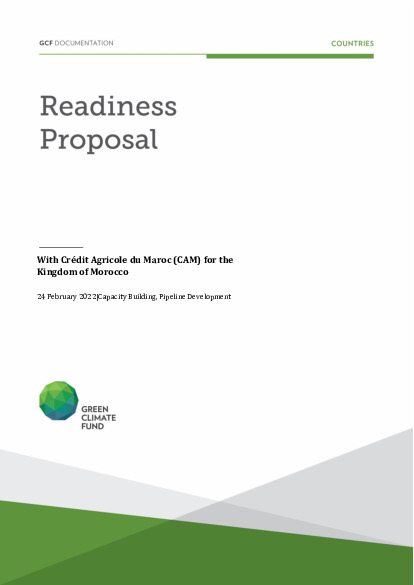Building the capacity of Crédit Agricole du Maroc (CAM) to complete its accreditation process and develop high-quality projects

Building the capacity of Crédit Agricole du Maroc (CAM) to complete its accreditation process and develop high-quality projects
Agriculture is a key sector in the Morocco NDC and country programme; indeed, the country more and more faces the adverse effects of climate change (droughts, floods, etc.) in this critical sector of the economy, and there is a great opportunity to mitigate greenhouse gas emissions related to the sector. At the same time, Morocco has strongly engaged in the fight against climate change, with a clear willingness to access climate finance more directly. Already, three national entities have been accredited to the GCF, and a few others are in the accreditation pipeline, including Crédit Agricole du Maroc (CAM). In Morocco, apart from CAM, the agricultural sector is traditionally underserved by existing financing institutions, and needs a specific approach. Thanks to its GCF accreditation and its 60 years of experience, CAM aims to bring climate finance to vulnerable farmers in order to help them adapt climate smart agriculture practices while improving their livelihoods.
CAM submitted its application for accreditation to the GCF on June 2016 for on- lending/blending, micro size project and Category C / Intermediation 3. CAM’s application is within stage 1 review, V3 of answers. Since the beginning of the application process, CAM has engaged considerable amount of resources to complete the GCF accreditation panel’s expectations and reach the GCF standards. However, some capacity issues still need to be overcome to fully comply with GCF requirements and achieve the accreditation level. This readiness proposal seeks to address the following gaps, challenges and weaknesses which have been identified in the past few years: i) there is no strong gender policy in place; ii) the environmental and social safeguards policy has just been put in place and needs to be assessed to check if it meets GCF requirements; iii) some issues are still being raised regarding the fiduciary requirements; iv) CAM’s project team needs to be trained on the design of high-quality climate projects meeting GCF standards.
In order to address the above mentioned gaps and challenges, the goal of this readiness proposal is the following: Building the capacity of Crédit Agricole du Maroc to complete its accreditation process and develop high-quality projects.
Sub-objectives for this readiness proposal address the gaps and challenges identified above; they include: i) build the capacity of CAM in meeting GCF accreditation standards (outcome 1.2); ii) build the capacity of CAM in preparing its first GCF concept note submitted to the GCF Secretariat (outcome 4.3); and iii) build the capacity of CAM in preparing its first GCF PPF and submit to the GCF Secretariat (outcome 4.5).
In line with addressing the identified challenges, and in order to meet the aforementioned objectives, the expected results of this readiness proposal include: i) CAM is able to address current or future GCF requirements regarding environmental and social safeguards and gender issues (outputs 1.2.2 and 1.2.3); ii) remaining issues in terms of fiduciary management have been sorted out (output 1.2.4); iii) CAM’s management and CAM team have been trained on climate change, GCF modalities and internal trainers are available to further strengthen climate finance understanding in the institution (outputs 1.2.5 and 1.2.6); iv) CAM team has been trained and is able to prepare high-quality climate change projects for the agriculture sector (output 4.3.1); and v) a concept note and a PPF have been prepared and are submitted to the GCF (output 4.5.1).
The direct beneficiaries of this proposal are CAM staff including top managers, the green finance department and other entities that may be involved in the accreditation process and project preparation, and CAM team to work on projects. The medium-term beneficiary is the Kingdom of Morocco, which may benefit from another accredited entity once CAM’s accreditation is confirmed. Final beneficiaries might include farmers who will benefit from climate smart financing for their investments once CAM is able to channel GCF financing.